This Is Chance!: The Shaking of an All-American City, a Voice That Held It Together by Jon Mooallem

Author:Jon Mooallem [Mooallem, Jon]
Language: eng
Format: epub
Amazon: B07TQKCM8J
Publisher: Random House
Published: 2020-03-24T00:00:00+00:00
* * *
—
BRINK’S OUR TOWN CAST, in March 1964, was a motley cross section of greater Anchorage. There was a silver-haired middle school English teacher, an African American prizefighter who worked for the Army Corps of Engineers, an aging maintenance man, a plumber, a handful of kids, a young navy veteran who’d auditioned mainly to meet girls, and a young gay man with coke-bottle glasses named Bob Deloach who’d been acting for Brink since he was a boy, latching on to the director as a kind of surrogate dad. (“Frank had a gift for seeing the hurt in people,” his friend Robin Niemann would later explain, “partly because he had some of his own.”) Mr. Webb, the newspaper editor, was played by a tradesman named Chick Sewell, who’d been roped into his first Frank Brink production by his wife six years earlier. Sewell had initially seemed irredeemably stiff as a performer, reciting his lines as though he were a schoolkid reading a report. But Brink had worked the man over into a proficient character actor.
Brink had also taken one big and unexpected risk with his casting. To play the lead, Emily Webb, he had recruited Susan Koslosky, an Alaska Methodist University freshman with no prior acting experience. Koslosky was a third-generation Alaskan from one of the state’s earliest pioneer families. She was eighteen and stunning, with dark eyes like a doe and a tall tangle of brown hair; a year earlier, she’d been crowned Miss Fur Rendezvous at the annual winter carnival, then first runner-up in the Miss Alaska pageant. Brink saw Koslosky as radiating a kind of fragility and innocence—exactly what he wanted for Emily—and bet on her to carry much of the play’s emotional weight. He considered her inexperience an asset. She would bring that guilelessness to the role.
In Koslosky’s mind, this air of virtue was merely a persona she had scrupulously crafted, or built up like scar tissue over her wounds. Koslosky’s parents separated when she was three years old. She saw her father only occasionally, when he came to argue with her mother about child support. Her mother, meanwhile, seemed emotionally unwell: sometimes she was loving; other times she’d snap at Susan ruthlessly, calling her worthless or a slut. To cope, and to prove her mother wrong, Koslosky had gradually affected a kind of divine poise. She got active in student government. She represented Alaska at a youth conference at the White House at age fourteen. She turned herself into a beauty queen. Then she enrolled in Frank Brink’s speech and drama class in her first semester at AMU. She had never before met someone who seemed so genuinely free and comfortable with himself. She decided to try acting herself.
Unfortunately, Koslosky wasn’t particularly good onstage. Brink had to push her, relentlessly, through the early rehearsals for Our Town that winter, and his dissatisfaction with her left her feeling dejected and trapped. One evening, they were rehearsing a scene between Emily and her father in Act II—a turgid but emotionally loaded conversation before he gives her away at the wedding.
Download
This site does not store any files on its server. We only index and link to content provided by other sites. Please contact the content providers to delete copyright contents if any and email us, we'll remove relevant links or contents immediately.
Man-made Catastrophes and Risk Information Concealment by Dmitry Chernov & Didier Sornette(4749)
The Revenge of Geography: What the Map Tells Us About Coming Conflicts and the Battle Against Fate by Kaplan Robert D(3602)
Zero Waste Home by Bea Johnson(3297)
COSMOS by Carl Sagan(2959)
In a Sunburned Country by Bill Bryson(2953)
Good by S. Walden(2920)
The Fate of Rome: Climate, Disease, and the End of an Empire (The Princeton History of the Ancient World) by Kyle Harper(2443)
Camino Island by John Grisham(2391)
A Wilder Time by William E. Glassley(2367)
Organic Mushroom Farming and Mycoremediation by Tradd Cotter(2314)
Human Dynamics Research in Smart and Connected Communities by Shih-Lung Shaw & Daniel Sui(2181)
The Ogre by Doug Scott(2120)
Energy Myths and Realities by Vaclav Smil(2066)
The Traveler's Gift by Andy Andrews(2017)
Inside the Middle East by Avi Melamed(1946)
Birds of New Guinea by Pratt Thane K.; Beehler Bruce M.; Anderton John C(1915)
Ultimate Navigation Manual by Lyle Brotherton(1770)
A History of Warfare by John Keegan(1723)
And the Band Played On by Randy Shilts(1620)
